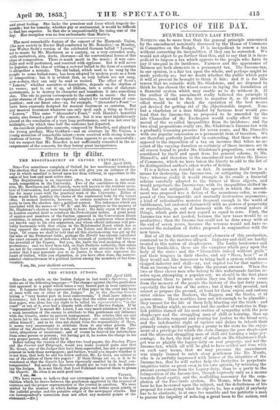The most remarkable feature of the concert of the Harmonic
Union, (the new society in Exeter Hall conducted by Mr. Benedict,) on Monday, was Walter Scott's version of the celebrated German ballad "Lenora," set to music by Mr. Macfarren as a cantata, on a very extended scale, with recitatives, airs, duets, choruses—all the conventional forms of this class of composition. There is much merit in the music ; it was care- fully and well performed, and received with applause. But it will never be popular, as the idea of setting a metrieai ballad in the form of a cantata is altogether a mistake. The old ballad, which used to be sung by the people to some ballad-tune, has been adopted by modern poets as a form of composition ; but it is evident that, as long ballads are not sung, now-a-days, they can only be read or recited. The effect of Scott's " Lenora,' whether narrative or descriptive, depends on the rhythm of its verses ; and to cut it up, ad libitum, into a series of elaborate movements, is to destroy its character and transform it into something else. The ode in poetry corresponds to the cantea in music : the irre- gular stanzas of the poem are expressly adapted for varied forms of com- position; and our finest odes—as, for example, "Alexander's Feast "- have been expressly designed for musical treatment as cantatas. But any musical treatment whatever can only spoil such a thing as Scott's "Lenora." This game "Alexander's Feast," with Handel's beautiful music, also formed a part of the concert; but it was most injudiciously placed at the conclusion of a very long performance and was not over by midnight,—by which time half the audience had departed.
An excellent pianoforte concerto, composed by Benedict, and played by the young prodigy, Miss Goddard—and an overture by Mr. Cusins, a young musician of remarkable talent—were received with strong demon- strations of favour. The Harmonic Union appears to go on successfully ; but we suspect that Mr. Benedict is not sufficiently consulted in the ar- rangements of the concerts, for they betray great inexperience.


























 Previous page
Previous page